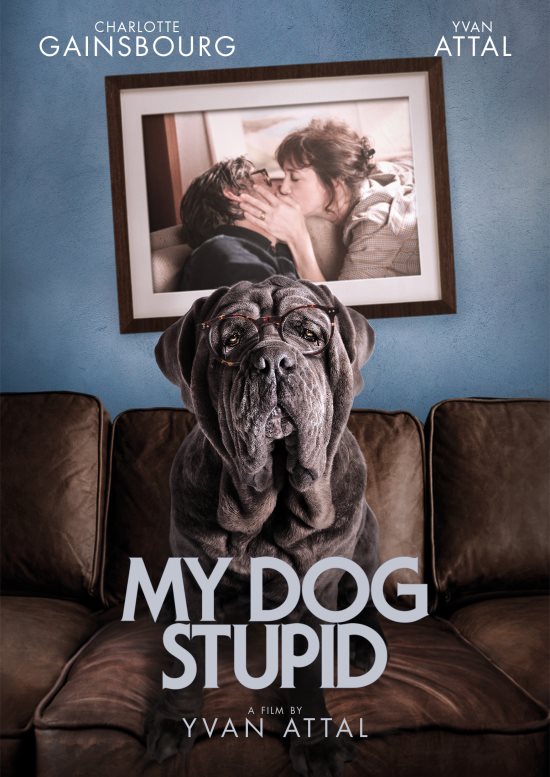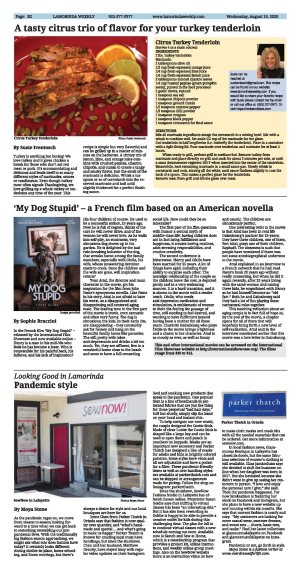| | Published August 19th, 2020
| 'My Dog Stupid' - a French film based on an American novella
| | | By Sophie Braccini |  | | Image provided |
In the French film "My Dog Stupid" - released by the International Film Showcase and now available online - Henry is a man in his mid-50s who feels he has become a loser. Who is responsible for his painful back, his failures, and his lack of inspiration? His four children of course. He used to be a successful author, 25 years ago. Now he is full of regrets, thinks of the cars he will never drive, and of the women he will never love. As he wails into self-pity, an enormous, very obnoxious dog shows up in his garden. He is delighted by the bad rule-breaking behavior of the dog, that wreaks havoc among the family members, especially with Cécile, his wife, whose unwavering devotion starts to crack. Once the children and the wife are gone, will inspiration return?
 Yvan Attal, the director and main character in the movie, got his inspiration for the film from John Fante's eponymous novella. Like Fante in his story, Attal is not afraid to bare his worst, as a disappointed and disappointing self-centered aging male. The leading tone in the first part of the movie is ironic, even sarcastic and often very funny. The dog is obnoxious; the kids, in their early 20s, are disappointing - they constantly ask for money and hang on the beautiful family home like parasites. The still pretty wife takes anti-depressants and drinks a bit too much. Yet, they are affluent, live in a wonderful home close to the beach and seem to have a full rewarding social life. How could they be so miserable?
Yvan Attal, the director and main character in the movie, got his inspiration for the film from John Fante's eponymous novella. Like Fante in his story, Attal is not afraid to bare his worst, as a disappointed and disappointing self-centered aging male. The leading tone in the first part of the movie is ironic, even sarcastic and often very funny. The dog is obnoxious; the kids, in their early 20s, are disappointing - they constantly ask for money and hang on the beautiful family home like parasites. The still pretty wife takes anti-depressants and drinks a bit too much. Yet, they are affluent, live in a wonderful home close to the beach and seem to have a full rewarding social life. How could they be so miserable?
 The first part of the film questions with humor a central myth of middle-class life: having children does not in fact bring fulfillment and happiness, it creates boring routines, adds stressing responsibilities, and crushes creativity.
The first part of the film questions with humor a central myth of middle-class life: having children does not in fact bring fulfillment and happiness, it creates boring routines, adds stressing responsibilities, and crushes creativity.
 The second undertone is bittersweet. Henry and Cécile have been married for 25 years. A lot of things have aged, including their ability to surprise each other. The nostalgic relationship of the couple as the children leave the nest, is depicted gently and in a very endearing manner. It is a hard transition, and it is shown in the movie with a tender touch. Cécile, who needs anti-depression medication and stimulation, is emblematic of women in their 50s feeling the passage of time, still needing to feel desired, and wanting to have fulfilment beyond having been a mother for all these years. Charlotte Gainsbourg who plays Cécile in the movie brings a lightness and a charm to her character. Attal is as moody as ever, as well as funny and caustic. The children are obnoxiously perfect.
The second undertone is bittersweet. Henry and Cécile have been married for 25 years. A lot of things have aged, including their ability to surprise each other. The nostalgic relationship of the couple as the children leave the nest, is depicted gently and in a very endearing manner. It is a hard transition, and it is shown in the movie with a tender touch. Cécile, who needs anti-depression medication and stimulation, is emblematic of women in their 50s feeling the passage of time, still needing to feel desired, and wanting to have fulfilment beyond having been a mother for all these years. Charlotte Gainsbourg who plays Cécile in the movie brings a lightness and a charm to her character. Attal is as moody as ever, as well as funny and caustic. The children are obnoxiously perfect.
 One interesting twist to the movie is that Attal has been in real life Gainsbourg's partner for 25 years; they have three children, one of them, Ben Attal, plays one of their children, Raphael. The closeness is such that people have wondered if there was not some autobiographical undertone to the movie.
One interesting twist to the movie is that Attal has been in real life Gainsbourg's partner for 25 years; they have three children, one of them, Ben Attal, plays one of their children, Raphael. The closeness is such that people have wondered if there was not some autobiographical undertone to the movie.
 Attal explained in an interview to a French network that he had read Fante's book 20 years ago without really connecting, but when he did it again recently, after 25 years living with the same woman and raising three kids, he empathized with Henry as he had himself become an "old fart." Both he and Gainsbourg said they had a lot of fun playing these caricatural roles together.
Attal explained in an interview to a French network that he had read Fante's book 20 years ago without really connecting, but when he did it again recently, after 25 years living with the same woman and raising three kids, he empathized with Henry as he had himself become an "old fart." Both he and Gainsbourg said they had a lot of fun playing these caricatural roles together.
 This touching reflection about an aging couple is in fact full of hope as, by the end of the movie, a chapter opens for all of them that will hopefully bring forth a new level of self-realization. Attal said in the interview mentioned earlier that this movie was a love letter to Gainsbourg.
This touching reflection about an aging couple is in fact full of hope as, by the end of the movie, a chapter opens for all of them that will hopefully bring forth a new level of self-realization. Attal said in the interview mentioned earlier that this movie was a love letter to Gainsbourg.
 This and other international movies can be accessed on the International Film Showcase website at http://internationalshowcase.org/. The films range from $10 to $12.
This and other international movies can be accessed on the International Film Showcase website at http://internationalshowcase.org/. The films range from $10 to $12. |
| | | | | | | | | | | | |



